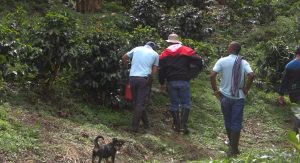Connecting climate justice and community philanthropy on the road to Bogotá
11 Oct 2023
Join us for a webinar on Wednesday 25 October!
How is the climate crisis affecting communities? People are suffering the effects of flooding, landslides, drought, wildfires and more gradual changes such as rising sea levels and decreased agricultural production. These events are becoming more and more prevalent. People are losing their livelihoods, getting caught in conflicts, and forced to migrate. The greatest impacts are falling disproportionately on those who are already most vulnerable.
During the COVID-19 pandemic, many local civil society organizations – including the Global Fund for Community Foundation’s network of community philanthropy organizations, community based funds, foundations and grassroots grantmakers – found themselves cast overnight into the role of public health responders, experts on social inclusion and key resource providers. In the same way, organizations that might not normally identify themselves as “climate actors” are increasingly observing and having to adapt to impacts of the changing climate in their day-to-day work. It will be these organizations – that are trusted by the communities that they serve – that will find themselves more and more on the frontlines of any emergency response.
As the climate crisis increasingly becomes everyone’s problem, it will affect every aspect of our lives. The siloes of civil society action (environment, livelihoods, education, community development, etc.) will become increasingly interconnected and boundaries dissolved. Research consistently shows that climate funding directed to the local level is an essential, efficient and sustainable part of any larger, integrated approach to the climate crisis. Yet the fraction of funding reaching local actors remains miniscule. Most recently, COVID-19 again highlighted the essential front-line role played by communities and their organizations in the face of crises, often the first to mobilize resources (money, in-kind, but also networks, knowledge, relationships) and to develop home-grown solutions to the challenges they face.
What can civil society organizations do to prepare for and respond to the potential and actual impacts of the climate emergency? What, if anything, is preventing local organizations from seeing themselves as actors in this space and as advocates for climate justice?
And, most importantly, what will it take to mobilize a vibrant, joined-up ecosystem of grassroots groups, civil society organizations, networks and alliances – that are supported and owned by the communities they serve and are part of – to be better positioned, resourced and networked to respond to climate and other challenges at the local level? How can we operationalize a systems approach which sees increased funding, knowledge, solidarity and trust flow in multiple directions? How can we do this in ways that shift, share and grow power? How can we do it in a way that strengthens the collective voice of grassroots communities and movements in the global climate discourse as well as in other broader conversations about shifting, sharing and building power?
Date: Wednesday 25 October
Translation: Será fornecida tradução para o português / Se facilitará traducción al español
This 90 minute session will begin at: 8:30pm Delhi / 6pm Nairobi / 4pm London / 3pm Accra / 11am New York / Noon São Paulo / 9am Mexico City
Organized in cooperation with



